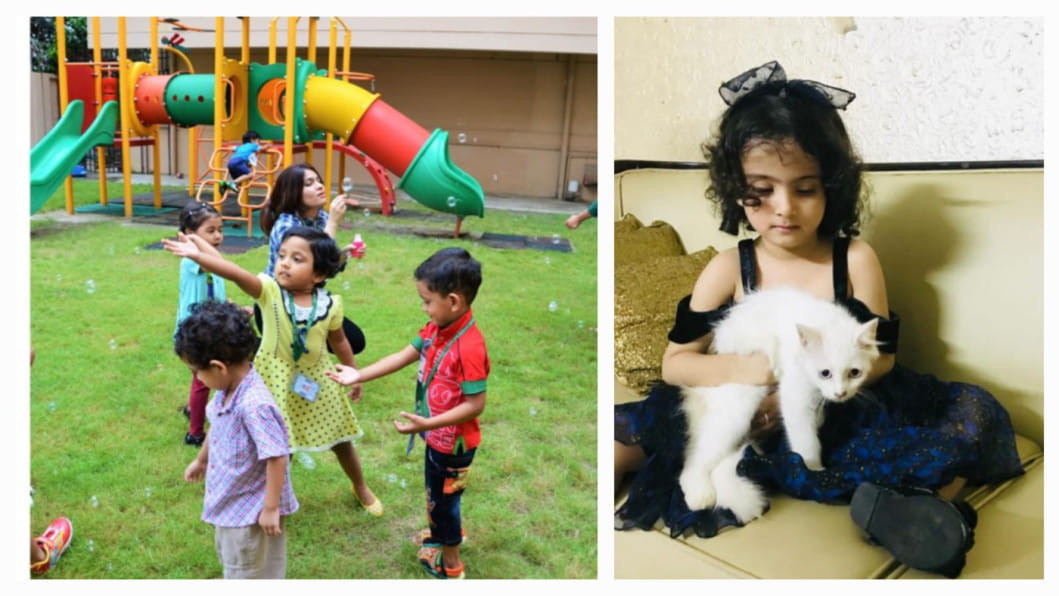How children can learn empathy from parents and teachers

As parents, we may think that our children will naturally grow into empathetic human beings as we are kind and empathetic ourselves, but it's not that simple. I often find many parents struggling to voice their concerns while dealing with children who show no signs of empathy, growing up to be mechanical, insensitive humans who don't feel any urgency to bother about the feelings of others.
We find ourselves asking why is this so common nowadays in contrast to when we were growing up in the 80s & 90s? Did our parents need to be concerned about this when we were being raised by them? The answer would be "no" because this was never considered to be an "extra" humane quality!
Today, acts of kindness or compassion are shared on social platforms to remind everyone that we are going out of our way to do something for someone.
No doubt, empathy is a complex socio-emotional skill to develop, but it's never impossible because empathy can be learned. As parents, we can foster empathetic behaviour and understanding in our children right from a very early age. We should not defend our children by saying that their insensitive, thoughtless behaviour is simply because of the fact that they are too busy with their studies and other commitments and don't have time to care about others. Children who grow up without empathy for other people's emotions often end up having mental health issues later on in life when they become adults.
Teaching empathy depends on more than being a good role model as a parent. We need to understand the psychology of empathy, and how the basic skills can be developed in children.
Empathy can be cognitive or emotional. Cognitive empathy is the ability to understand another person's perspective and feelings, and feel their pain. Emotional empathy, on the other hand, points to an emotional response someone experiences in the backdrop of a particular incident or event, either because you sympathise with the person (reactive empathy) or because you feel similar to the other person's feelings (parallel empathy).
NURTURING EMPATHY THROUGHOUT CHILDHOOD
If parents and teachers work together, we can ensure that our children grow up to be kind and empathetic human beings. It's important to understand the feelings of others and be able to respond appropriately as empathy helps children to build a strong sense of security and also stronger relationships with their family members, relatives, peers, teachers and other individuals around them.

So, what are the roles parents and teachers need to play in order to instil a sense of empathy in children?
THE ROLE OF THE PARENTS
Know your children and understand their emotional state. We need to know our children and they need to know us as parents. There's no better way to know your child than by spending quality time with them to understand their emotions.
Parents should ask questions and allow children to ask questions about anything they feel and freely talk about all issues with their parents. Talking to your child about how other people may be feeling, and why they feel so is a great way to make them empathetic towards others. This also helps to build their emotional language and process other people's perspectives.
Second, help your child to recognise and name their feelings from an early age, as understanding their own feelings is the first step towards understanding the feelings of others. Meanwhile, it is important to help your child understand vulnerability. When parents demonstrate vulnerability and share problems with their children, it allows them to understand and identify problems and crises.
Third, practice empathy. When parents and other adults practice empathy in front of the children in their daily lives, children also follow. Compassion and acts of kindness starts at home just like they say charity begins at home. Moreover, as parents, you should be unbiased and non-judgmental if you want your children to be the same.
Fourth, embrace diversity. Being empathetic towards others coming from diverse backgrounds allows children to understand what they are going through and also what they have in common with others. Parents should encourage their child to express interest in those belonging to various ethnic and religious backgrounds so that their understanding of other people's emotions are not limited to their own kind of people.
Apart from these, there are many other things which the parents can follow in order to help their children empathise with others. Help children to develop self-control and manage feelings effectively. We often hear parents saying that their children cannot handle certain situations as they are too vulnerable. When children don't express empathy, it's not because they don't have it, it's because some feeling or image is blocking their empathy. Often the ability to care for others is overwhelmed, for example, by anger, shame, envy, or other negative feelings. Helping children to manage negative feelings helps to release their empathy.
Again, guide your children to understand that the world doesn't revolve around them. It's vital at times for parents to put children's concern for others above their happiness, for example, insisting at times that children turn off their personal gadgets and help you with your household works. In the meantime, allow your child to be kind to animals and keep pets if possible. Caring for animals and plants helps children to understand the role they play in helping another living thing survive, thrive, and be happy.
Finally, allow your child to participate in family discussions. Children who are kept away from family problems, challenges or conflicts aren't able to understand and deal with certain situations as they grow older. Children should have the opportunity to understand that we have to deal with difficult times in life and be able to voice and encourage their perspectives with other family members. Listen carefully to your children's views and ask your children to listen carefully to the views expressed by others.
HOW TEACHERS CAN CONTRIBUTE
Teachers can play a significant role in gradually building empathy in their students. For example, a teacher can encourage empathy to be nourished among peers. Ask the children about their peers and how well they learn as a team. Encourage them to support their peers and discourage any kind of conflict. When they're in conflicts with peers, ask students to consider their peers' perspectives.
Regular class discussions and sessions can play instrumental role in this regard. Organise discussions during circle time, assembly or pastoral class on empathy and arrange activities to cultivate the culture of empathy in the students.
Meanwhile, teachers should encourage students to observe others closely and tell them to try to understand what their peers are going through. They can start off by talking about their observations about someone's expressions or reactions to a particular incident and ask them to relate to that. This way children can be encouraged to observe the reactions of others and note the body language of others and guess how they might be feeling.
Collaborative events and activities are a helpful way. Teachers should plan and arrange collaborative activities and group work regularly to encourage the students to share ideas and work together.
Brené Brown, a famous American professor, author and motivational speaker, once said, "Empathy has no script. There is no right way or wrong way to do it. It's simply listening, holding space, withholding judgment, emotionally connecting, and communicating that incredibly healing message of 'You're not alone.'" We need to keep these valuable words in mind while trying to instil empathy in our children.
The writer is the Head of Junior School, DPS STS School Dhaka.

 For all latest news, follow The Daily Star's Google News channel.
For all latest news, follow The Daily Star's Google News channel. 










Comments